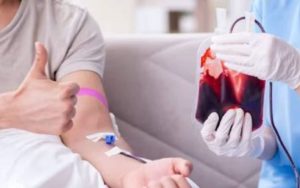
An average adult has around 10 pints of blood in their body, which is roughly 8 percent of their weight. When a person donates blood, they lose about 1 pint of blood.
Our body can replace all the lost blood and fluids. Often, we may have heard the doctors say that it is important to donate blood. Have you ever wondered how blood gets replaced in the body and where the old blood goes? Millions of red blood cells die and are made every second. When you donate blood, you lose red blood cells and the body needs to make more to replace them. There are special cells in the kidneys that can detect the low levels of oxygen in the blood due to the loss of red blood cells and start to secrete a protein. This protein then passes through the bloodstream and reaches the bone marrow. The bone marrow is responsible for producing stem cells, which are the building blocks that the body uses to make red and white blood cells and platelets. The stem cells then develop more red blood cells, than the white cells or platelets.
The RBCs are responsible for transporting oxygen to the various parts of our body through haemoglobin. So how does the old blood get replaced? Well, the body makes new blood every day and the old blood keeps getting destroyed. The old blood gets transferred to various parts of the body and new blood is formed. The blood flows through the circulatory system, which includes the heart, arteries and veins. Once the blood cells get too old, they are destroyed by the spleen. The spleen is a blood-filtering organ that removes microbes and destroys old or damaged red blood cells.
The replacement of old blood and the formation of new blood happens quickly and is a continuous process. It does not take much time. The perfect example to explain this is when someone donates about half a litre of blood, the person can recover quickly as the body immediately starts making red blood cells to compensate for the lost blood. Diet and exercise also play an important role in the proper formation and circulation of blood in the body.




 Driving Naari Programme launched in Chandigarh
Driving Naari Programme launched in Chandigarh






























